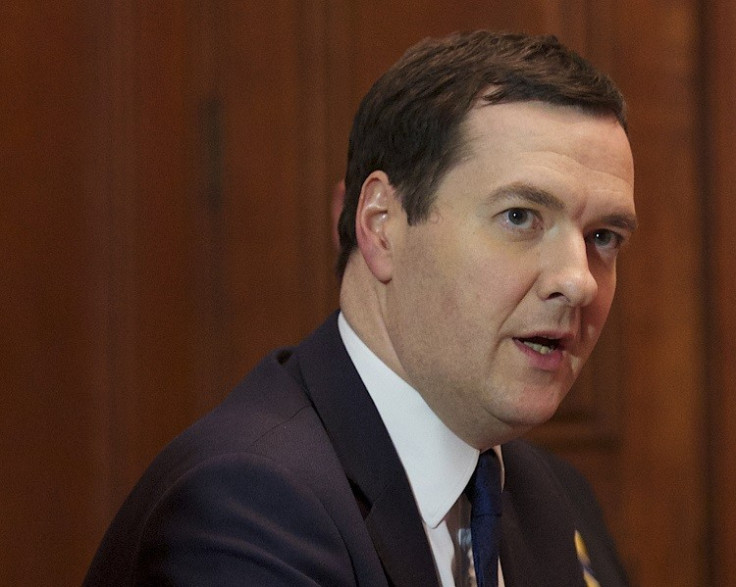George Osborne's Trade-Led UK Recovery is Dead

Like the shriek of an alarm clock which jolts us awake from the Land of Nod, the Office for National Statistics has just rudely interrupted George Osborne's dreams of an export-led recovery.
At a time when the sun is starting to rise over our key export markets again, heralding a new warm dawn for the global economy, our goods exports are falling.
According to the ONS, total UK goods exports fell 4.1% in value during the three months to October when compared with the previous quarter. This is in spite of the eurozone taking steps, albeit tentative ones, to recovery; a strengthening of the US economy; and Chinese demand picking up again.
Worse still, analysis of the data by the Centre for Economic and Business Research (CEBR) suggests that the UK's dire trade situation wiped 0.9% off real GDP growth during the same quarter.
It's easy to blame Osborne for many things. But to be fair to the man, he didn't cause the eurozone crisis or the global economic slowdown, both of which seriously hurt UK trade.
We can, however, blame him for the reaction to these unforeseen obstacles on the "Path to Prosperity" he claims we're on.
Instead of extending the timeframe of his austerity programme, to keep public money in the domestic economy and so support growth from the inside when outside offered little support, he cut deeper and deeper.
He sucked cash out of the economy right at a time when it needed it the most. He instead pinned every last one of his dismal hopes on an ill-fated trade-led recovery. This ambition, encapsulated by his ludicrously unattainable £1tn target value for exports, is dead.
Rebalancing towards manufacturing is impossible if you don't have the export markets there to support the production of goods. It will take years to build up new markets and for our old trading allies, who we are trying to shift away from, to fully recuperate.
Because he didn't support the domestic economy with an increase in capital investment in infrastructure projects, paid for with the absurdly cheap borrowing costs gifted to us by the Bank of England's £375bn of gilt-purchasing stimulus, he must look elsewhere for his austerity-hindered recovery.
Osborne has now pegged his hopes to unsustainable consumer spending and a dangerous housing market gamble that risks fuelling a bubble.
A risky housing-led recovery is already giving the Bank of England a headache as weak supply and bouncing demand, following the aid of cheap mortgage credit schemes such as Help to Buy, fuels speculation of a bubble being blown.
And unsustainable consumer spending because wages are still in real terms decline and will be until 2015, leaving households to deplete savings or borrow from payday lenders- the Black Widows of the financial sector. We can't keep spending more and more when wages are declining.
The Office for Budget Responsibility (OBR), the UK's independent fiscal watchdog, pointed out in Osborne's 2013 Autumn Statement that GDP is increasingly reliant on household consumption and the property market. It also said business investment and net trade would be sluggish. Flat, even.
Osborne only needs to convince enough people that there's a bona fide recovery until May 2015, when his party hopes to be re-elected on the back of rising GDP however hollow the headline numbers are.
Hopefully the British electorate will feel in their pockets for the recovery and discover its inherent emptiness.
What the UK needs, in the absence of a trade-led rebound, is a domestically-driven recovery that balances the need to reform public finances with a healthy, productive and prosperous economy.
Osborne has targeted welfare spending in particular for his assault on public spending as a means of erasing the structural deficit. It is a noble ambition to reduce the cost of welfare, but Osborne's means of doing so are brutal, ham-fisted and counter-productive.
Rather than grabbing food from the mouths of children, hounding families out of their homes and switching off their radiators, we should be creating enough well-paid, full-time jobs so the working poor, who dominate the country's welfare recipients, can afford to live independently in the first place.
An eye-opening report from the anti-poverty charity the Joseph Rowntree Foundation found that 6.7 million working families in modern Britain are below the poverty line, as welfare lifelines are cut away and the jobs market is stuffed with low-hours, low-pay dreck.
At the moment, we need a serious fiscal boost for industries like construction, where heavy investment in a new wave of social housing would not only create meaningful work for those who need it, but also bring down the housing benefit bill and rental costs too.
We must lift the National Minimum Wage to a level that better reflects the basic cost of living in the UK. We must create new rules to incentivise firms to narrow the pay gap between the executives at the top and the workers below, which should lift those at the bottom, up.
We must put more emphasis on employee-owned co-operatives where workers can have a fair share of their productivity's spoils. All of these things put more money into people's pockets, reduce their reliance on state welfare, and increase revenue for the Treasury through higher tax receipts and things like more rent payments from social housing.
By all means try to grow exports and support the UK manufacturing sector, but you can't rely on only this for the recovery. What happens when this mono-vision strategy fails, as it is at the moment?
Osborne is facing the mucky politics of a general election. At the cost of everyone except his party's politicians, he'll rely on an unsustainable recovery with superficially impressive numbers for the sake of power.
Osborne is a politics man at heart. Power and ideology are his ultimate interests. We and our economy are paying the price.
© Copyright IBTimes 2024. All rights reserved.







